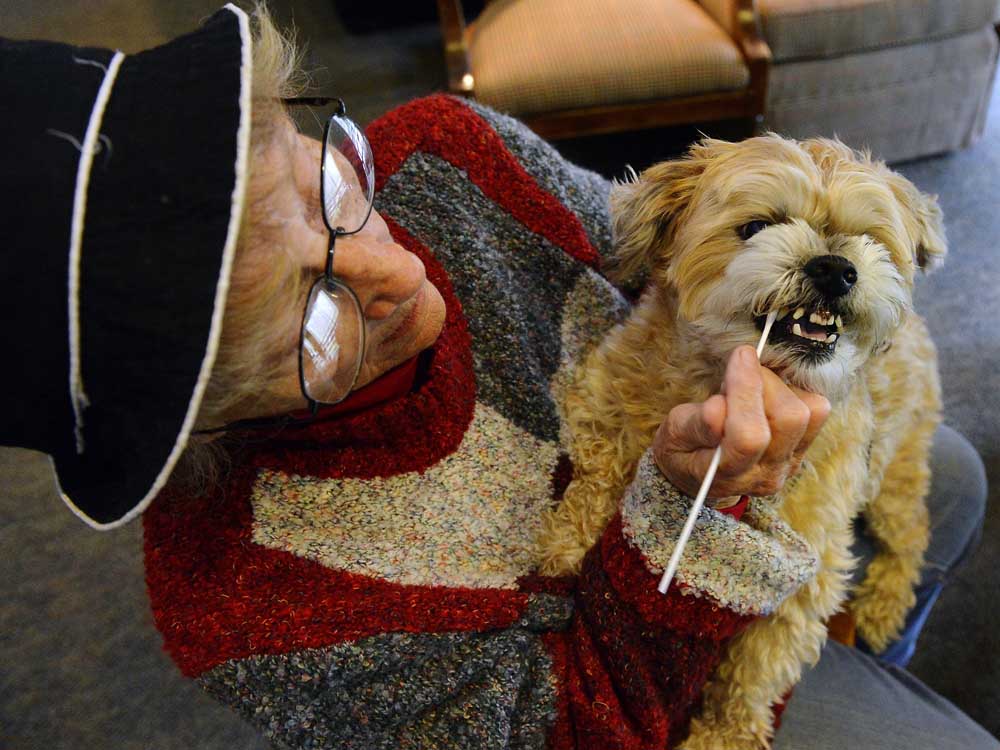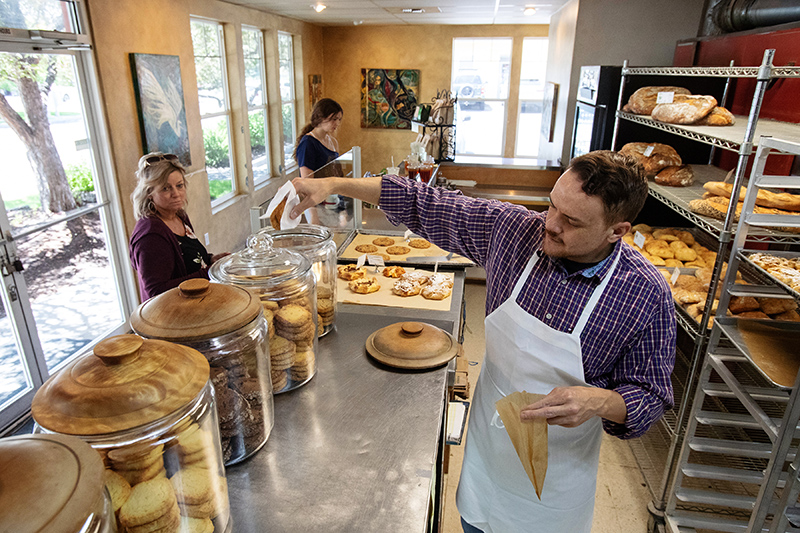Poop patrol: tracking dog DNA
Published 12:00 am Friday, May 9, 2014

- Jill Toyoshiba / Kansas City StarPooPrints, a pet waste management company, helps apartment managers identify untidy residents and their dogs. PooPrints recommends owners swab their own dogs, as resident Patricia Haylan does to her Lhasapoo, Darby, in Kansas City, Mo.
KANSAS CITY, Mo. — As winter turned to spring at the Wau-Lin-Cree Apartments, the dog piles revealed themselves, lumps of unscooped doo just waiting to greet the sole of a sneaker.
Enough tenants complained to spur property manager Karen Peevy to action.
A dog’s DNA doesn’t lie. With this in mind, Peevy turned to the Internet to confirm that, indeed, CSI-style forensics could match a mound of poop to the critter that deposited it.
“We are starting a program known as PooPrints,” she wrote last month to the renters along Line Creek Drive in Kansas City, Mo. “We will need a cheek swab DNA sample of all community dogs.”
DNA collections
The cheek-swabbing began last week, just one small reflection of a growing pet-DNA industry.
And given the problem on the ground, who wouldn’t hope this industry succeeds?
Helping Wau-Lin-Cree management along is a Tennessee outfit with the same name, PooPrints. At a cost of $35 for each dog owner in the complex, PooPrints will collect, analyze and store genetic profiles in a global database, enabling sleuths to match future fecal samples to the dog that dumped it.
“I’ve been so excited about this,” Peevy said. “Once we have every dog swabbed, we’ll go through a very thorough cleaning of the grounds before we start collecting and testing new stuff that shows up.
“Our hope is that people on their own will start picking up after their pets.”
Owners of the offending mutts will face a $50 fine to cover the cost of sending each poop sample to the testing lab. Eviction would be the ultimate penalty.
“I’m thinking of making it three strikes and you’re out,” Peevy said.
PooPrints regional representative Charles Nash, whose territory covers four states, said the 286-unit Wau-Lin-Cree complex is his first Kansas City client.
In less than a year, he said, he’s lined up 65 clients, all of them apartment properties and homeowners associations.
For most pets, DNA collection is painless — just 10 seconds of having a cotton swab rubbed along the inside cheek to gather up loose skin cells.
“You always get some dissenters who say you’re violating the dog’s privacy rights,” said Eric Mayer, director of business development at BioPet Vet Lab in Knoxville, Tenn.
The lab receives the swab samples by mail. Poop samples will follow, also in the mail — just a nickel-sized slice shaken in a plastic vial containing an inert solution to give it, in Nash’s words, “a milkshake consistency.”
Wau-Lin-Cree’s maintenance crew will be tasked with that job.
A variety of uses
Pet DNA has many applications.
So many, in fact, that industry watchers see a future in which registering the DNA of domestic animals and livestock will be as routine as vaccinations.
“You no longer need blood to get an animal’s DNA profile. You can get a lot now with a simple swab,” said Randy Smith, accounts manager for DDC Veterinary lab in Fairfield, Ohio.
“On the human side of DNA sampling, which we also do, you’re dealing with some serious and sad issues,” said Smith. “You’re looking there at custody disputes, crimes committed, people in prison who’ve been wrongly convicted. With pets, it’s just a lot of fun.
“For one, you can identify the poopetrators among us.”
Or, you can reclaim a lost pet with proof positive it is yours.
A small number of labs today will analyze pet DNA to confirm the parentage of purebred show dogs. Online DNA storage services can help ranchers recover stolen cattle or horses.
A freshly plucked feather from your parrot will allow DDC Veterinary to determine the bird’s gender.
Pet DNA has even helped solve awful crimes.
In 2009, Clay County, Mo., prosecutors used genetic tests on Henry Lee Polk’s cats to convict him in the slaying of a Kansas City man.
A single cat hair recovered from the rummaged-through pockets of Polk’s victim contained secrets about the animal’s mitochondria, which are passed from mother to offspring. Scientists at the University of California-Davis discovered the same genetic makeup in two cats prancing around Polk’s residence.
“It was the first time that cat mitochondrial DNA was used in a court of law,” said Beth Wictum, director of forensics for the University of California-Davis School of Veterinary Medicine.
She said the school’s Veterinary Genetics Laboratory is the only U.S. lab accredited to analyze pet DNA for criminal investigations. In one case, traces of dog excrement found in the tread of an Indiana man’s shoes placed him at the scene of a triple homicide, for which the man is now serving a life sentence behind bars.
Citywide dog DNA databases?
Granted, as crimes go, unscooped dog poop is minor by comparison.
Yet Ipswich, Mass., animal control officer Matt Antczak is among the multitudes tired of dog owners not picking up. He’s asking the town council to become what may be the first municipality in America to require DNA registration on every resident canine.
Known by his neighbors as the “poop Nazi of Ipswich,” Antczak blamed dog waste for high levels of E.coli that can fill local streams and shut down clam factories.
If Ipswich would take out an $80,000 loan, Antczak said, the town could collect and file away DNA samples from all of its 2,000 dogs at no expense to their owners.
“You need all dogs in to make it work,” he told The Star. “I just want the people who are guilty to pay.
“If we can prove who’s violating and fine them $200 a whack,” he said, “we’ll have that $80,000 loan paid off in two and a half years, maybe three.”
Wau-Lin-Cree tenant Patricia Haylan was among the first this week to schedule a swabbing appointment in the clubhouse for her dog Darby.
She was happy to do so.
“The dog droppings around here were getting outrageous,” Haylan said. “And I knew it wasn’t Darby. I pick up after him.”
For Haylan’s trouble, the PooPrints people provided a pack of biodegradable clean-up bags and a couple of Milk-Bones. Haylan also left the clubhouse with the assurance that Darby’s genetic profile will be included in a BioPet registry for positive identification should he run off and someone else try to claim him.
“Darby has a microchip, too,” she said, “so I’m double-covered.”






